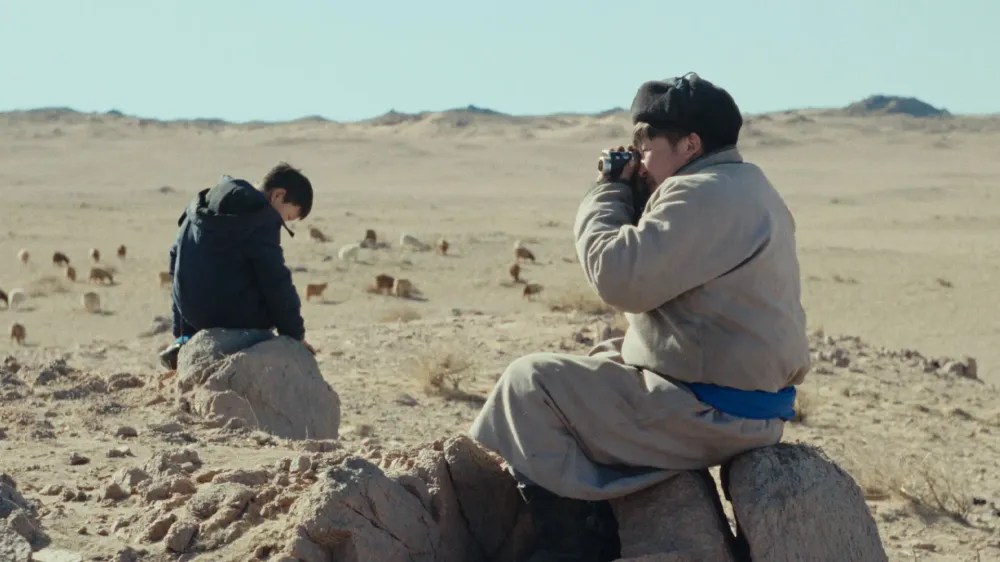Subscribe to The Curb podcast via RSS feed, Apple Podcasts, Spotify, or iHeart Radio. Download the episode directly here.
The art of co-authored filmmaking is being finessed and perfected within the realm of Australian cinema. Jaydon Martin and Adam C. Briggs pull documentary filmmaking into narrative structures, dismantling their existence to create something new with films like Flathead and Boogie Bobby being equally driven by their subjects as much as their directors. Yet, this is reality guiding fiction, so what happens when reality guides reality?
Well, you end up with the work of Maya Newell, who has built a filmography of co-authorship with films like In My Blood it Runs and The Dreamlife of Georgie Stone, documentaries that depict versions of the truth from the past, present, and future state of the subjects. Or, you have someone like Gabrielle Brady who actively works to liberate the viewer's gaze by working with her co-authors to bring stories like Island of the Hungry Ghosts and her latest masterwork, The Wolves Always Come at Night, to life.
Co-authorship is a form of filmmaking that decentralises the authorial voice of a director, allowing the subjects or collaborators to engage in the art of self-determination and blended authorship. What results is a form of filmmaking that leans into Island of the Hungry Ghosts co-author Poh Lin Lee's thesis of narrative therapy. While I'm not able to explain what narrative therapy is in practice, I can expand on my take on it as a viewer, in that the act of communally driven narrative storytelling allows for reflective and supportive ways of telling stories built on aspects of trauma, grief, and loss.
For Davaa and Zaya, the co-authors of The Wolves Always Come at Night, that notion of loss comes from a loss of connection to culture, land, farming practices, and their home, the Gobi Desert. This is a quiet film at times, one that allows their story of displacement to linger in the now, yet it's one that is made through moments of filmmaking that is not exactly reenactments, but rather the art of tapping into memories and giving them the space to come to life on screen.
I saw The Wolves Always Come at Night at the Adelaide Film Festival in 2024, and it's a film that has crept into my dreams ever since. Davaa and Zaya's memories have found space to run within my mind, scenes that have been brought to life with the empathetic gaze of Michael Latham's immersive cinematography. I dream of the horses running over the desert, but I also dream of them in the town where Davaa and Zaya are pulled to. I dream of the towering mounds of mining detritus that pilfers the land for all the soulless corporations feel it's worth, leaving behind a destroyed and devastated culture. I dream of a world where we hold all of these notions, and many more, in the same breath, and yet somehow, manage to give them the space to exist as singular entities.
As I tell Gabrielle in the following interview, when a new Gabrielle Brady film emerges into the world, it is like the arrival of a gift, one that pulls us into a mindset of considering the lives of others, including those of the crabs of Christmas Island, or maybe the horses of the Gobi Desert. It's one that encourages us to see the world of truth differently. That notion of truth is something I've asked filmmakers a lot lately, and I'm conscious of its almost accusatory nature, as if documentary filmmaking must adhere to one True Reality. But it's impossible. The truth can never be captured on screen, and truth is in itself a falsity. After all, as soon as you put a camera on an event, or slice it with an editing suite, or apply a score to it, you are skewing reality away from the truth. Documentary storytelling is, by its own creation, not the truth. Yet, the emotions that we're left with and the memories that linger in our mind after the film has long played out, become a source of truth. Yet, as I slip into this spiral a little further, it's clear that co-authored filmmaking like that of Gabrielle Brady's exists to explore versions of the truth, to bring stories of subjects and collaborators to life, and to enrich our collective world.
These notions are underpinned by Gabrielle's choice to study at the prestigious La Escuela Internacional de Cine in Cuba, a place which fosters the notion to 'defend the rights to ones own image' and to 'liberate the viewer's gaze'. These are ideas that I ask Gabrielle about in the following interview, which gives way to an open conversation about her creative process, and what it means to be able to work alongside people like Poh Lin, Davaa and Zaya, and Michael Latham, on her films.
This interview was recorded ahead of Wolves' screenings at the Sydney Film Festival on 10 and 12 June, with a national release from 3 July 2025. Visit Madman Entertainment for more details. This is a film I urge audiences to see in a cinema, let it overwhelm your senses. Let it change you. If you're interested in reading about how the film changed me, then you can read my review here.
Follow us on Instagram, Facebook, and Bluesky @thecurbau. We are a completely independent and ad free website that lives on the support of listeners and readers just like you. Visit Patreon.com/thecurbau, where you can support our work from as little as $1 a month. If you are unable to financially support us, then please consider sharing this interview with your podcast loving friends.
We’d also love it if you could rate and review us on the podcast player of your choice. Every review helps amplify the interviews and stories to a wider audience.
Screening or Streaming Availability:

